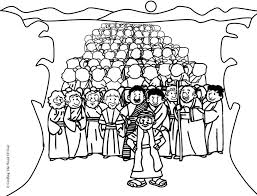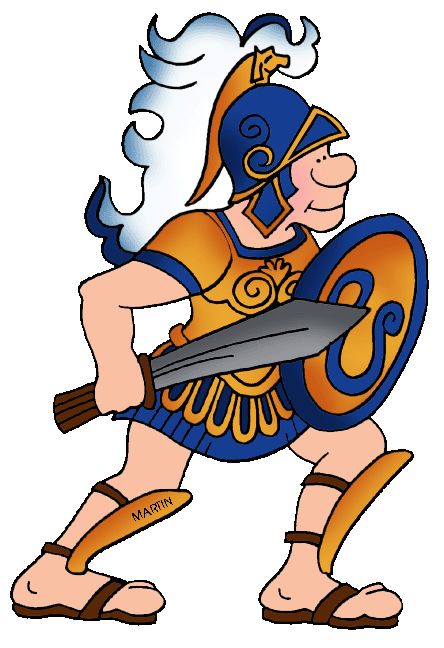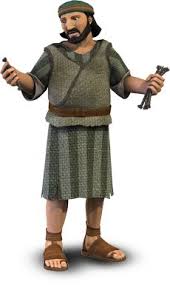Joshua 8:1 – And the Lord said to Joshua, "Do not fear and do not be dismayed. Take all the fighting men with you, and arise, go up to Ai. See, I have given into your hand the king of Ai, and his people, his city, and his land."
Now that the sin of Achan had been removed from Israel, they are ready to conquer Ai.

We can understand that they might be a little hesitant to move forward, since they had been routed the last time. For this reason, God comforts Israel by specifically telling them not to be afraid or discouraged; he was guaranteeing their victory against Ai, just as he did at Jericho. With God once again on their side, they were assured of being successful.
Notice that God commands them to bring the entire army to the battle this time. As it turned out, the entire army did not need to fight in the war against Ai. However, knowing there were reinforcements at hand must have been reassuring to the active troops. Besides, it was important that the entire army be on hand to witness the victory that God was about to work on their behalf. This would build up their faith for the next battle.
We should also consider the viewpoint of the other kingdoms of Canaan. When Israel crossed the Jordan, all the Canaanite kingdoms melted with fear (Joshua 2:11). They believed that Jehovah, the God of Israel, was more powerful than any of their own gods. Any hope they had of defeating Israel melted along with their courage.
However, when Israel was defeated by the insignificant kingdom of Ai, it changed the way these heathen nations thought about God. They began to think that the victory at Jericho was nothing more than a fluke. And if that was true, then Jehovah was not a God to be feared or worshiped. But with the defeat of Ai, fear of the Lord returns to the heathen nations in Canaan.
As for the king of Ai, he had not been idle while Israel was taking care of the business of Achan. Anticipating that Israel would attack again, he called upon the people of nearby Beth-el for military assistance.
Joshua 8:2 – "And you shall do to Ai and its king as you did to Jericho and its king. Only its spoil and its livestock you shall take as plunder for yourselves. Lay an ambush against the city, behind it."
During the battle of Jericho, God had literally given the victory into Israel's hands. He made sure the walls fell so that Israel could go in and take the city.
However, that was a 'one-time' situation. In the case of Ai, God was not going to give Israel the same type of miraculous assistance. From now on, the army of Israel was going to have a more active and traditional role in attacking her enemies and taking the land.

This was important because with each battle, Israel's army was gained more experience and more confidence. So instead of a miracle, God gives Israel strategic plans for an ambush, which they would need to carry out themselves. This is not to say that God did not help Israel; he certainly did. His help just came in a different way.
This presents us with an interesting spiritual parallel. God has given to each one of us a portion of faith:
Romans 12:3 -For I say, through the grace given unto me, to every man that is among you, not to think of himself more highly than he ought to think; but to think soberly, according as God has dealt to every man the measure of faith.
God will allow the enemy to attack us on occasions, because it gives us an opportunity to use our faith. As we use/exercise our faith, we find that it both grows and strengthens. This in turn allows us to fight even greater spiritual enemies and gain bigger spiritual victories. We can conclude that it actually good for us to engage in spiritual battles because it seasons us and prepares us for the future. In much the same way, Israel was strengthened and seasoned by every battle they faced – including the one with Ai.
God commanded Israel to treat the city of Ai just as the city of Jericho, with the exception of the spoil. This meant that all the inhabitants of the city were to be killed and the city burned. But this time, the men were free to enrich themselves with whatever spoil as they could carry away.
The resources and treasures of Ai were only the beginning - Israel was henceforth permitted to take the spoil of the all the rest of the cities they conquered. These supplies would be Israel's means of support throughout the years of the conquest.
Joshua 8:3-4 – So Joshua and all the fighting men arose to go up to Ai. And Joshua chose 30,000 mighty men of valor and sent them out by night.And he commanded them, "Behold, you shall lie in ambush against the city, behind it. Do not go very far from the city, but all of you remain ready."
While the battle plan is clear, the numbers seem a bit confusing.
In verse one, God instructs Joshua to send the entire army out to capture Ai. In verse three, we are told that Joshua forms a detachment of 30,000 men and sends them out under cover of night to station themselves behind the city of Ai in preparation for an ambush. Yet verse 12 says Joshua 'took about 5000 men and set them in ambush between Bethel and Ai, to the west of the city'.
This difficulty has been explained in a couple of different ways. One theory says that Joshua sent the detachment of 30,000 men behind the city of Ai, but then he took 5,000 of that 30,000 and reassigned them to a position much closer to the walls of the city. They probably concealed themselves in the immediate perimeter of the town. Their job was either to intercept the first squads that were sent out of Ai, or to block the roads so reinforcements from other cities could not join the battle. The remainder of the army approached the main gate of Ai under the command of Joshua.
While this is a possibility, it should be noted that it would be very difficult for 30,000 men to successfully travel to Ai undetected, even if it was night. The sound of their footsteps alone would be quite loud. It would only take a single barking dog to give their position away!
Another explanation for the discrepancy/difference between verses one, three and 12 is that the 5,000 mentioned in verse 12 was simply a transcription error, or what we might call a 'typo'. In other words, the number mentioned in verse 12 should have been 30,000, but the man who manually transcribed the scriptures simply made an error. If this is correct, then there were only two groups – the 30,000 who spent the night in ambush behind the city and the rest of the army who marched on the front gates at the command of Joshua.
But there are problems with this theory too. We are left with the same difficulty of 30,000 men sneaking up on the city in the middle of the night. There is also another issue as well. There were approximately 600,000 soldiers in the army of Israel. If the majority of the army (over 550,000 men) marched straight toward the front gates of Ai, the men of Ai would never have left the city. They would have been far better off to force Israel into a siege, rather than fighting them man-to-man.
This brings us to the third possibility. Joshua must have brought the entire army with him to Ai, because that was what God instructed him to do. The army camped on one side of a valley, while Ai was on the other side. Most of the army remained hidden from view.

Joshua then formed a detachment of 30,000 soldiers to mount the attack on Ai. Of these 30,000 Joshua sent 5,000 to lay in wait behind the city, while the other 25,000 would attack the main city gates.
This explains why the men of Ai weren't afraid to leave their city and fight – they thought they were only fighting a force of about 25,000. This scenario also makes more sense because it would be much more realistic for 5000 men to sneak up on the city rather than 30,000.
Joshua 8:5-6 – "And I and all the people who are with me will approach the city. And when they come out against us just as before, we shall flee before them. And they will come out after us, until we have drawn them away from the city. For they will say, 'They are fleeing from us, just as before.' So we will flee before them."
Regardless of the actual numbers, the overall battle strategy was clear:
There was a band of soldiers hidden in the woods behind the city of Ai.
Meanwhile the other 25,000 hand-picked men would visibly approach the main gates of the city. When the army of Ai came out to engage in battle, Israel would pretend to be afraid. They would stage a carefully orchestrated retreat, which mimicked their last defeat.
The men of Ai, thinking they were going to easily defeat Israel again, would empty the city in pursuit of Israel. As they chased the Israelites, they would get further and further away from the city.
Joshua 8:7-8 – "Then you shall rise up from the ambush and seize the city, for the Lord your God will give it into your hand. And as soon as you have taken the city, you shall set the city on fire. You shall do according to the word of the Lord. See, I have commanded you."
When the army of Ai traveled far enough away from the city, the Israelite ambush force was to attack the city. With the help of God and all of the troops outside the city walls, it should be easy for the small detachment to subdue the city.

Once they had control of the city, they were to set a fire. This was the signal that the city had been taken. Once the fire was set, the men would reform ranks near the gates.
When Joshua smelled the smoke and saw the fire, he would signal the rest of the troops to stop the fake retreat. They were to turn around and begin fighting the men of Ai, who would then be trapped between the two Israelite forces.
Joshua 8:9-10 – So Joshua sent them out. And they went to the place of ambush and lay between Bethel and Ai, to the west of Ai, but Joshua spent that night among the people. Joshua arose early in the morning and mustered the people and went up, he and the elders of Israel, before the people to Ai.
The elders of Israel were the chief magistrates and rulers of the people. Essentially, they were advisors to Joshua. It was natural for them to accompany him to the battle lines, to assist him with advice if needed and to give him encouragement.
These men also assisted in dividing the spoil.
Numbers 31:27-And divide the prey into two parts; between them that took the war upon them, who went out to battle, and between all the congregation:
It was the elder's job to make sure that the spoil taken from the city was divided equally between the combatants and the rest of the people.
According to the command of God, the distribution of the booty was always the same – the share of the soldiers was the same as the share of those who stayed behind. Thus, the entire nation of Israel benefitted when a city was conquered.
Joshua 8:11-12 – And all the fighting men who were with him went up and drew near before the city and encamped on the north side of Ai, with a ravine between them and Ai. He took about 5000 men and set them in ambush between Bethel and Ai, to the west of the city.
It is evident that Joshua was a good general. We know that in verse two, God suggested that Joshua use an ambush against Ai. But it was up to Joshua to work out the details.
- He was the one who decided the number of troops to put on the ambush.
- It was his idea to send them at night, to maintain the utmost secrecy.
- It was Joshua who came up with the strategy of drawing the men of Ai outside the city by faking a retreat, while his other troops easily subdued a city devoid of any soldiers.
- It was his idea to set a fire in the city as a signal that it was taken and the ruse was to be discontinued.
All in all, Joshua planned a very good attack against his opponents.
Joshua 8:13-14 – So they stationed the forces, the main encampment that was north of the city and its rear guard west of the city. But Joshua spent that night in the valley. And as soon as the king of Ai saw this, he and all his people, the men of the city, hurried and went out early to the appointed place, toward the Arabah to meet Israel in battle. But he did not know that there was an ambush against him behind the city.
Joshua's troops went down into the valley by night. They stationed themselves where they would be easily seen by the soldiers of Ai at the crack of dawn.� (Joshua himself went to higher ground, as we will see). The king of Ai, who did not see the ambush behind him or the total number of Israeli troops hiding across the valley, thought Israel was attacking with a very small group of men, just as they had before.

In his pride, the king of Ai confidently hurried to gather his troops and engage Israel in battle. He was sure this day would be a day of great victory for him; songs would be written to glorify his military might and the strength of his gods. His fame would spread throughout the land of Canaan. He would be enriched by the spoil he would take from the camp of Israel, not to mention the treasures he would obtain by stripping the dead soldiers.
Little did he know that by the end of the day, he would be dead.
Clearly, the true victory in this battle was given to Israel by the Lord of Hosts.
- It was God who gave Joshua the idea of an ambush.
- It was God who 'blinded' the understanding of the king of Ai (and his advisors) so that he did not suspect the trap that was set for him.
- It was God who silenced the footsteps of the 5000 soldiers so that they could sneak up behind the enemy undetected.
- It was God who protected the men of Israel as they faked a retreat.
Thus, we see that even though God did not move in the same miraculous way he did at Jericho, he was still the reason Israel won the war.
Joshua 8:15-17 – And Joshua and all Israel pretended to be beaten before them and fled in the direction of the wilderness. So all the people who were in the city were called together to pursue them, and as they pursued Joshua, they were drawn away from the city.Not a man was left in Ai or Bethel who did not go out after Israel. They left the city open and pursued Israel.
This verse mentions that the troops of nearby Beth-el also participated in this battle.
Beth-el was a walled city smaller than Ai. It is believed that Beth-el was a tributary of Ai. As such, the two cities would have made a pact that if/when one of them was attacked, the other would render aid. For this reason, the majority of the troops of Beth-el had already been stationed in Ai right after the first attack of Israel.
The scripture tells us that 'not a man was left' in either Beth-el or Ai. This does not literally mean that the entire male population went out to war; the very old and the very young obviously stayed behind. The meaning is that every military man left the city in the battle with Israel.
Joshua 8:18-19 – Then the Lord said to Joshua, "Stretch out the javelin that is in your hand toward Ai, for I will give it into your hand." And Joshua stretched out the javelin that was in his hand toward the city. And the men in the ambush rose quickly out of their place, and as soon as he had stretched out his hand, they ran and entered the city and captured it. And they hurried to set the city on fire.
Joshua's use of the javelin is another indication that God was directing the army of Israel and giving her victory.
Practically speaking, Joshua no doubt stayed on higher ground with the javelin in his hand. Many scholars believe he had a flag or ensign attached to the end of the javelin, to make it more visible.

From his vantage point, he could see the entire battle unfold. He watched as the gates of Ai opened, and Israel's enemies hurriedly rushed from the safety of the city while shouting threats. He saw his own men fake a retreat down into the valley. The troops of Ai got further and further from the city and at precisely the right moment, the Lord spoke to him, commanding him to point the javelin toward Ai.
At that signal, the ambush was sprung. The 5,000 hidden troops rushed into the undefended city, immediately captured it, and quickly set a portion of the city on fire.
Although the fire was big enough to send the message that the city was taken, it was not intended to destroy the whole city, as they still wanted to loot it. After they had taken all of Ai's goods and livestock, then the city would be completely destroyed.
The raising of the javelin was not just a sign to spring the trap. It was also a symbol or token of God's presence and assistance. One can't help but compare it to the battle against Amalek, where Moses sat upon a rock and raised his hands into the air:
Exodus 17:11-12 - And it came to pass, when Moses held up his hand, that Israel prevailed: and when he let down his hand, Amalek prevailed. But Moses' hands were heavy; and they took a stone, and put it under him, and he sat on it; and Aaron and Hur held up his hands, the one on the one side, and the other on the other side; and his hands were steady until the going down of the sun.
In verse 26 of this chapter, we learn that Joshua kept the javelin raised and pointed at Ai until all the enemies of Israel were destroyed. Again, this shows that God was actively fighting on behalf of his people, even though this miracle was not as noticeable as the walls of Jericho falling down.
Joshua 8:20-21 – So when the men of Ai looked back, behold, the smoke of the city went up to heaven, and they had no power to flee this way or that, for the people who fled to the wilderness turned back against the pursuers. And when Joshua and all Israel saw that the ambush had captured the city, and that the smoke of the city went up, then they turned back and struck down the men of Ai.
Suddenly, the tables turned. The men of Israel turned around and began to fight the men of Ai in earnest. Meanwhile, the surprised men of Ai began to smell smoke.
They soon realized their true predicament – they had left their wives, their children and all their possessions unguarded. The city had been taken and they were sandwiched between their foes. They literally had no hope or chance of escape. They were so panic stricken, they froze.
Joshua 8:22 – And the others came out from the city against them, so they were in the midst of Israel, some on this side, and some on that side. And Israel struck them down, until there was left none that survived or escaped.
Because of the assistance of God, the men of Ai found themselves surrounded at the exact time they were most confident of victory. This is a very comforting principle for the church of Christ.
Sometimes it seems as though evil is everywhere and we aren't making any headway against it. It seems as though darkness always wins. But we can take hope knowing that if we stop and listen to the Lord, he will turn the tide when the time is right.

When he pours out his Spirit the powers of darkness will be broken. The Satanic forces that have blinded the spiritual eyes of people will be removed and they will flock to Christ. God has not set his church up for defeat, but for victory. And that victory may just come when our enemy is most confident of his success.
Which do you think was louder – the shouts of victory from the men of Israel or the shrieks of the men of Ai, who were overcome by terror and confusion?
Job 20:5 -That the triumphing of the wicked is short, and the joy of the hypocrite but for a moment?
The enemies of Israel were unable to fight or flee; death was certain for each one of them. Job was correct when he noted that the triumph of the wicked is short lived.
What lessons can we learn from the account of the battle of Ai?
- God's timing is always perfect. While we prefer that everything happens instantly, that is seldom God's plan. Scripture tells us that there is a 'time for everything, and a season for every activity under the heavens' (Ecclesiastes 3:1). We should submit not only to God's commands but his timing as well.
- Each person had a part to play in the victory against Ai. Some of the men stayed at the camp, while some were assigned to the ambush party and some marched straight to the city. The elders did their part by dividing the spoil. When the church fights against the forces of darkness, each of us will have a part to play too; no one person can do it all. Be sure you understand your gifts and spiritual abilities and make use of them.
- Over and over and over God instructs his people not to be afraid. When the church looks at the evil forces arrayed against her, we must keep in mind that there is nothing to fear because God fights on our behalf. He has promised that the gates of hell will not prevail against his church (Matthew 16:18).
- We should do everything within our power to elect and support godly officials, like Joshua. When we have honest, upright, God-fearing men and women in positions of leadership, the entire country will benefit. But when evil is in power, we will all suffer.
Let me offer you some encouragement:
As we mentioned previously, God has given each individual person in the church a role to play in the defeat of evil. The apostle Paul likens this to the members of a human body – some are the hands, some are the eyes, some are the knees, etc. The point is that each one of us has distinct gifts and abilities that are useful to the kingdom of heaven and to the local church.
So please don't withhold your gift from the body. You may have the exact skill that is needed during the battle. Think of it this way – a soldier would be much less effective if he only had one arm or one foot. In the same way, the body of Christ cannot operate at full strength unless all the members are actively involved.
Let me offer you some relief:
The gifts and talents that we possess must be strengthened and developed. For instance, you may have the spiritual gift of words of knowledge. But it will take practice to clearly hear these words from Holy Spirit and to know how to deliver these messages to the body of Christ.
All of us are bound to make mistakes as we grow in our gifts. So, let's be patient with one another. Let's also be sure to submit to the pastor's authority, so mistakes can be kept to a minimum when they do occur.
Whatever you do, don't allow a mistake to stop you from using your gifts. Learn from what you did wrong, pick up the pieces and continue the fight!
Let me offer you some strength:
You are a vital part of the army of God! Therefore, it is imperative that you strengthen and prepare yourself to do well in battle. You can begin by checking the status of your spiritual armor.
According to Ephesians 6:10-18, every Christian should have a complete set of armor including the belt of truth, a breastplate of righteousness, shoes made of the gospel message, a helmet of salvation, a shield of faith and the sword of the Spirit.
Good soldiers check their weapons/clothing before the battle begins. This gives them the best chance of success in the conflict. Likewise, we need to prepare in advance for attacks of the enemy. What is the status of your armor? Today is a good day to find out!
